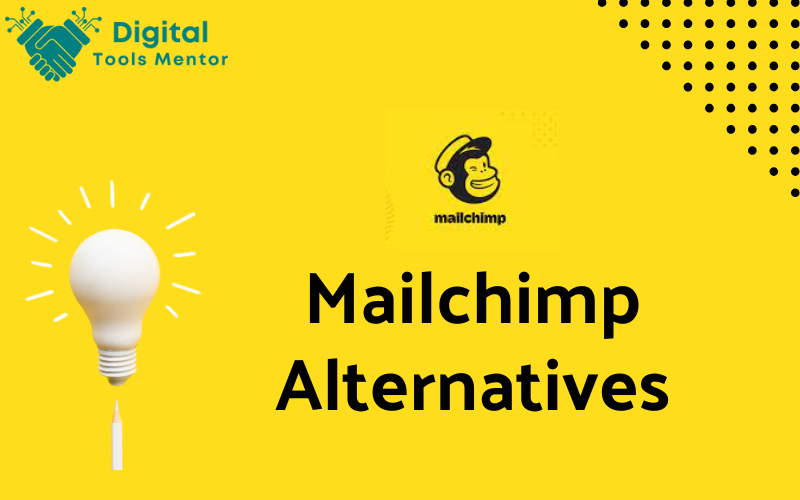9 Best Mailchimp Alternatives in 2025 (Free & Paid)
In the vast realm of digital marketing, email campaigns continue to hold their ground as a powerful bridge between businesses and their audience. It’s more than just sending messages; it’s about fostering relationships, building trust, and driving actionable results in an increasingly competitive market.
Since its inception, Mailchimp has risen to prominence, not merely as an email service provider but as a beacon in the email marketing landscape. Its user-centric interface combined with its expansive feature set has made it a go-to choice for businesses ranging from budding startups to established giants. Yet, the growing demand for Mailchimp Alternatives indicates a shift in the market, showcasing its unparalleled versatility in catering to varied marketing needs.
However, as with all tools, Mailchimp doesn’t resonate with everyone. Diverse business objectives, budget constraints, or the sheer need for specific functionalities not covered by Mailchimp have led many to explore other platforms. The search for a Mailchimp alternative isn’t about finding a replacement—it’s about discovering a platform that aligns more closely with unique business goals and operational preferences.
List of 9 Best Mailchimp Alternatives in 2025 (Free & Paid)
1. Brevo (SendinBlue)
Brevo (SendinBlue) is a comprehensive email marketing solution, known for its SMS campaigns and transactional emails, emphasizing scalability and performance.
Key Features
- Flexible pricing based on emails sent.
- SMS campaign capabilities.
- Transactional emails.
- Advanced segmentation.
- Pricing: Offers a free plan and then starts at $25/month based on features and emails sent.
Pros
- Affordable for startups
- Intuitive interface.
- Advanced automation
Cons
- Some templates can be basic
- Higher learning curve for certain features
2. ActiveCampaign
ActiveCampaign combines classic email marketing tools with CRM functionalities, making it a go-to for businesses focused on customer experience.
Key Features
- CRM integration.
- Advanced automation.
- Lead scoring.
- Sales automation.
- Pricing: Starts at $15/month based on the number of contacts and features.
Pros
- Robust reporting tools.
- Flexible and powerful automations.
- Good deliverability rates.
Cons
- UI can be overwhelming initially.
- Might be overkill for small businesses.
3. GetResponse
GetResponse is not just an email marketing platform but also offers webinar hosting and landing pages, emphasizing versatility.
Key Features
- Visual automation workflow builder.
Landing page builder.
Webinar tools.
E-commerce features.
Pricing: Starts at $15/month based on list size and features.
Pros
- Comprehensive toolset beyond just email
- User-friendly interface
- Good A/B testing capabilities
Cons
- Limited integrations in basic plans
- Templates can feel dated
4. Moosend
Moosend offers a streamlined approach to email marketing, focusing on ease of use, automation, and affordability.
Key Features
- Drag-and-drop email editor.
- Advanced segmentation.
- Behavioral email triggers.
- E-commerce AI.
- Pricing: Free plan available; premium plans start at $8/month.
Pros
- Affordable with a free tier.
- Intuitive design tools.
- Efficient customer support.
Cons
- Lacks some advanced features of bigger platforms.
- Limited integrations in the free plan.
5. Drip
Drip is tailor-made for e-commerce, providing tools to drive sales through email marketing and automation.
Key Features
- E-commerce CRM.
- Advanced automation workflows.
- Personalization tools.
- Multi-channel marketing.
- Pricing: Based on the number of contacts, starting at $19/month.
Pros
- E-commerce-centric features.
- Strong segmentation options.
- Direct integration with many online store platforms.
Cons
- May be over-specialized for non-e-commerce users.
- Higher cost for larger contact lists.
6. MailerLite
MailerLite offers a straightforward and efficient approach to email marketing, perfect for small businesses and those just starting out.
Key Features
- Drag-and-drop editor.
- Landing page builder.
- Pop-up customizer.
- Embedded surveys.
- Pricing: Free for up to 1,000 subscribers; starts at $10/month after.
Pros
- User-friendly interface.
- Affordable with a generous free tier.
- Good deliverability rates.
Cons
- Limited advanced features.
- Approval process for sending can be stringent.
7. Omnisend
Omnisend positions itself as the all-in-one e-commerce marketing automation platform, integrating several channels into one.
Key Features
- E-commerce-centric tools.
- SMS and push notifications.
- Pre-built automation workflows.
- Advanced segmentation.
- Pricing: Free basic plan; premium plans start at $16/month.
Pros
- Multichannel marketing in one platform.
- Direct integrations with e-commerce platforms.
- User-friendly experience.
Cons
- Basic plan is quite limited.
- Higher learning curve for certain features.
8. HubSpot Email Marketing
Part of the broader HubSpot ecosystem, their email marketing tool seamlessly integrates with the CRM and offers a suite of tools for inbound marketing.
Key Features
- Drag-and-drop email editor.
- A/B testing.
- Personalization.
- Native integration with HubSpot CRM.
- Pricing: Part of HubSpot’s suite, starting at $50/month.
Pros
- Deep integration with other HubSpot tools.
- Comprehensive analytics.
- User-friendly interface.
Cons
- Can be expensive when combined with other HubSpot products.
Overkill for those just needing email marketing.
9. Klaviyo
Brief Description: Klaviyo is a powerhouse for e-commerce email marketing, offering deep integrations and data-driven personalization.
Key Features
- E-commerce platform integrations.
- Data-driven personalization.
- Advanced automation workflows.
- SMS marketing.
- Pricing: Based on the number of contacts, with a free tier available for up to 250 contacts.
Pros
- Deep data insights for personalization.
- Direct integrations with e-commerce platforms.
- Robust reporting.
Cons
- Pricier as the list grows.
- Can be complex for beginners.
5 Key Factors to Consider When Exploring Mailchimp Alternatives
In the dynamic world of email marketing, businesses seek solutions that align perfectly with their goals and budgets. While Mailchimp has long been a dominant force, it’s not a one-size-fits-all solution. From cost considerations to specific feature requirements, user experience preferences to integration necessities, and concerns about future scalability, several reasons might nudge businesses to explore platforms beyond Mailchimp’s realm. Let’s discuss some important factors to consider.
1. Pricing Concerns
While Mailchimp offers a range of pricing tiers suitable for different business sizes, some users argue that the costs can be a touch steep, especially when contrasted with the features provided. Small businesses and startups, in particular, may find the price tag challenging, especially when they’re only utilizing a subset of the platform’s features. Furthermore, as a business grows and its email list expands, Mailchimp’s pricing can scale significantly, making users question the value-for-money aspect.
2. Feature Gaps
No platform is perfect, and while Mailchimp boasts a comprehensive suite of tools, there are areas where it might fall short. For instance, some users might seek advanced automation workflows, detailed segmentation options, or specific reporting functionalities that Mailchimp doesn’t prioritize. These perceived gaps can compel businesses to scout for platforms that bridge these specific feature deficits, tailoring more closely to their nuanced email marketing requirements.
3. Usability Issues
Mailchimp is renowned for its user-friendly interface, but ‘user-friendly’ is a subjective term. Some users, especially those who might be transitioning from another platform or those with unique workflow processes, might find Mailchimp’s interface not as intuitive as touted. Moreover, certain functionalities, like A/B testing or campaign analytics, may seem buried or not as straightforward to some users, leading to a steeper learning curve.
4. Integration Limitations
In an interconnected digital ecosystem, the ability to seamlessly integrate with other platforms is paramount. While Mailchimp offers numerous integrations, it doesn’t encompass every third-party tool out there. Businesses heavily reliant on certain CRM systems, e-commerce platforms, or other specific tools not supported by Mailchimp might find themselves in a bind, making them consider alternatives that offer a wider or more suitable range of integrations.
5. Scalability Concerns
Mailchimp is versatile, catering to both small and large businesses. However, as businesses expand, their email marketing needs can evolve dramatically. They might require more advanced features, a greater degree of customization, or enhanced support – areas where they might feel Mailchimp isn’t growing with them. The fear of outgrowing a platform’s capabilities can be a valid concern, prompting businesses to preemptively switch to platforms they deem more scalable in the long run.
5 Key Features to Evaluate in Mailchimp Alternatives
Selecting an email marketing platform is no trivial task, especially given the myriad of choices available. When considering an alternative to Mailchimp, businesses should zero in on specific features that can potentially augment their email marketing endeavors. But what exactly should they be on the lookout for? Let’s dive into the details of these essential aspects
1. Flexible Pricing Models
In an ever-competitive market, startups and growing businesses need solutions that won’t break the bank. A Mailchimp alternative should offer pricing tiers that provide a robust feature set without compromising on affordability. The ability to choose a plan based on the number of subscribers, emails sent, or specific features required allows businesses to optimize costs while ensuring they get the tools they need.
2. Comprehensive Design Tools
An engaging email is as much about its content as its design. Alternatives should present users with a suite of intuitive, dynamic design tools that can make emails stand out. Whether it’s drag-and-drop editors, a plethora of templates, or advanced customization options, the platform must empower users to craft visually captivating emails without requiring expert design skills.
3. Advanced Automation Capabilities
Time is of the essence, and automation is the key to efficient email marketing. Platforms should offer sophisticated automation workflows, allowing businesses to nurture leads, send timely reminders, and engage users with minimal manual intervention. From triggering emails based on user actions to setting up complex multi-step campaigns, automation capabilities can drastically enhance a campaign’s effectiveness.
4. Integration Flexibility
A standalone email marketing tool can only do so much. The real magic happens when it seamlessly integrates with other digital tools a business relies on. Whether it’s e-commerce platforms, CRM systems, or social media channels, a worthy Mailchimp alternative should offer easy and diverse integration options, ensuring a cohesive digital ecosystem for the business.
5. Analytics & Reporting
Knowledge is power, and in the realm of email marketing, this translates to in-depth analytics. To gauge the success of their campaigns and continually refine their strategies, businesses need detailed reports. From open rates, click-through rates, to user engagement metrics and conversion tracking, a platform should provide comprehensive insights, helping businesses make informed decisions.
9 Best Mailchimp Alternatives in 2025 (Free & Paid): Final Thoughts
In the ever-evolving realm of email marketing, businesses and individuals need tools that align with their specific needs and growth trajectories. While Mailchimp has long been a frontrunner, it’s evident that the market offers a plethora of robust alternatives tailored to various niches and requirements. From e-commerce centric platforms like Drip and Klaviyo to comprehensive marketing solutions like HubSpot, there’s something for everyone. As you evaluate your email marketing needs, consider these nine Mailchimp alternatives, each bringing its unique strengths to the table. Remember, the best tool is one that complements your goals, fits within your budget, and empowers your marketing campaigns to achieve greater success.
Read our blog on 23 Best Email Marketing Platforms in 2025 to get better insights.
Mailchimp Alternatives FAQs
1. Why would I consider a Mailchimp alternative?
While Mailchimp is a well-established and widely-used email marketing tool, some users might seek alternatives due to pricing, specific feature requirements, usability preferences, integration needs, or scalability concerns.
2. Are there any free Mailchimp alternatives available?
Yes, several platforms offer free plans, such as SendinBlue, MailerLite, and Moosend. These free tiers usually come with limitations but can be a great starting point for small businesses or individuals.
3. How do the automation capabilities of alternatives compare to Mailchimp?
Many Mailchimp alternatives, like ActiveCampaign and GetResponse, offer advanced automation features, sometimes even more sophisticated or customizable than Mailchimp’s.
4. Can I easily transfer my contact list from Mailchimp to another platform?
Most email marketing platforms allow for easy import of contact lists. However, it’s essential to ensure your list complies with the new platform’s terms and anti-spam regulations.
5. Do these alternatives offer better deliverability rates than Mailchimp?
Deliverability can vary based on several factors, including the platform, email content, and sender reputation. Some alternatives might offer higher deliverability rates, but it’s essential to research and maybe even test a few platforms to determine the best fit.
6. Are there alternatives tailored specifically for e-commerce businesses?
Yes, platforms like Drip, Klaviyo, and Omnisend are specifically designed with e-commerce businesses in mind, offering integrations with major e-commerce platforms and features tailored for online sales.
7. How do Mailchimp alternatives fare in terms of integration with other tools?
Many alternatives offer a wide range of integrations with CRMs, e-commerce platforms, payment gateways, and other tools. Platforms like HubSpot Email Marketing and ActiveCampaign are particularly known for their extensive integration capabilities.
8. Do these alternatives offer support for SMS marketing?
Some Mailchimp alternatives, such as SendinBlue and Klaviyo, offer SMS marketing capabilities, allowing users to integrate their email and SMS marketing campaigns.
9. How user-friendly are these Mailchimp alternatives for beginners?
Most alternatives aim for user-friendliness, with platforms like MailerLite and Moosend being particularly lauded for their straightforward interfaces. However, as with any tool, there may be a learning curve, especially for more advanced features.
10. Are there any long-term contracts or commitments required with these alternatives?
Most email marketing platforms operate on a month-to-month basis, allowing users to upgrade, downgrade, or cancel their plans without long-term commitments. However, some might offer discounts for annual billing.




